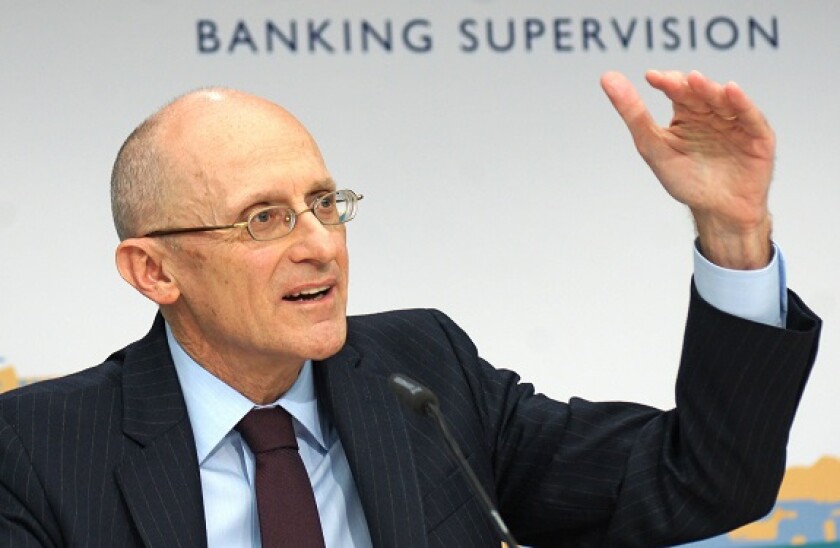The supervisory arm of the European Central Bank is looking for ways to deter banks from the riskier end of leveraged lending, according to the Financial Times, demanding banks hold extra capital. That is bad news for the European economy, and runs contrary to the central bank’s other initiatives.
As Covid-19 vaccination programmes are rolled out and lockdowns lift, the credit taps for challenged borrowers must be turned open to the fullest, with banks able to take a view on the recovery prospects of damaged industries. It will be crucial, in the months ahead, for airlines, hotels, cruise lines, ferry companies and restaurant chains to be able to refinance, return emergency cash, and prepare to earn their way out of the earnings black hole that was 2020.
Right now, that’s very much on the table. Some companies will need to restructure their liabilities, and will probably look outside the banking market for the new money to help them do so. But lots of companies in the 'stressed but not distressed' camp will find themselves turning to capital markets — taking underwritten term loan 'Bs', or bridges to high yield bonds.
At that moment, the credit committees of Europe’s investment banks will not want to be second guessing their supervisor. There will be plenty of credit work to do of their own, without trying to figure out if a particular position will mean a round of capital punishment on top of the existing underwriting risk.
The situation will be particularly dire if supervisors adopt a leverage-based approach to risk analysis. This was broadly the treatment of leveraged lending that the Federal Reserve and the Office of the Comptroller of the Currency used in the US before 2017. It also features in the ECB’s existing, but ineffectual, leveraged lending guidelines.
In both cases, six times levered was seen as a normal maximum, with explanations demanded of more aggressive deals. The ECB was very strict on permitting Ebitda add-backs, which reduce headline leverage levels, while the Fed, which had more powers of enforcement, was more lenient.
Using a crude leverage number based on the previous 12 months, as in the past, will be a disaster for precisely the stressed businesses that need access to credit the most. Ebitda numbers for locked down businesses will be shocking, meaning headline leverage levels will be stratospheric this year.
The market has already acknowledged this in most cases, with banks granting waivers of leverage covenants, often replacing them instead with minimum liquidity restrictions.
An attack on leveraged lending also sits awkwardly with the ECB’s other initiatives.
In adjacent corporate credit markets, such as the investment grade bond market, the central bank came in guns blazing, pushing headline rates to 0% for the strongest companies, and compressing credit differentiation.
Investment grade bonds do not normally touch the banking market — and hence don’t worry bank supervisors — but pricing there affects pricing for bank loans, and the tightening in investment grade markets spills over to the top end of the leveraged market as investors go from the former to the latter in search of yield.
Turning to SME lending, bank supervisors in Europe for many years have defied the Basel Committee to keep the “SME Supporting Factor” in place, which cuts capital requirements for SME lending by nearly a quarter, compared to other assets with the same loss expectations.
It’s a straight capital subsidy to SME lending. Through the Covid-19 crisis, government guarantee schemes and enthusiastic encouragement from policy makers have kept the banks lending. In contrast to leveraged finance, lending to smaller companies is seen as mission-critical for European economies — something to be preserved at all costs, rather than criticised.
Supervisors will always want to supervise, and naturally worry about the downsides rather than the upsides, which accrue to the banks themselves. Leveraged lending can be risky, and banks can make big losses messing it up. It needs to be taken seriously, and it’s reasonable for a supervisor to want reassurance.
But if they want some comfort, last year ought to help provide it.
The chaos of March and the closure of the market left banks stuck with some huge positions in highly Covid-afflicted industries — a loan to buy Stonegate, a pub chain, for example, or one of Europe’s largest ever LBOs, the ThyssenKrupp Elevator financing.
Almost all of these had been cleared by the end of the year, and most by the end of July. Banks proved to be firm holders of their underwrites, able to pick and choose their exit points. The margins and discounts were elevated, at least at first, but it was no bloodbath, and there was no forced selling. Funds that thought some of the hung bridges would come out at bargain basement prices proved disappointed.
These exits, admittedly, were achieved partly thanks to the colossal amounts of central bank intervention in other parts of the capital markets, but provide a real-life, recent and sizeable stress test — and one which the leveraged finance market passed with flying colours.
If banks do experience regulatory restrictions on their ability to underwrite leveraged loans, the market will adapt. Non-banks and direct lenders will do more complex or more levered transactions, European investment banks will lose yet more market share, and some kind of market will persist.
But the real losers, in the short term, will be the medium sized businesses hoping to raise money to finance their return to normal trading that the policy makers have vowed to support. Regulate, if you must, but it would be wrong to strangle recovery right now.

